On Mistakes, Art-Studio Endorphins, and
Serving the Story with Illustrator Tom Lichtenheld
 April 28th, 2015 by jules
April 28th, 2015 by jules
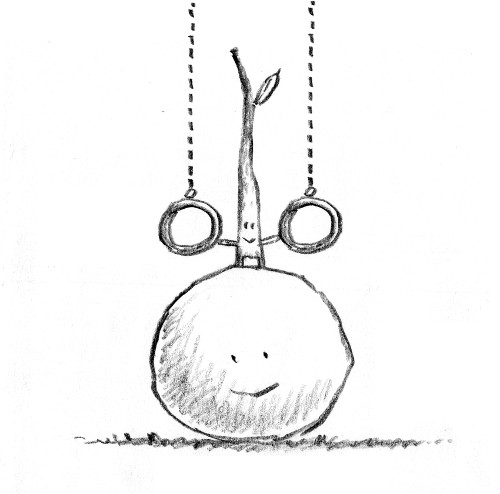
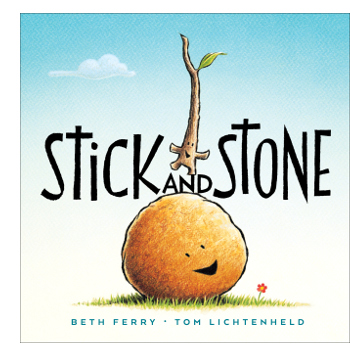 Illustrator Tom Lichtenheld visits 7-Imp this morning to share the backstory of the illustrations for Beth Ferry’s Stick and Stone, released earlier this month by Houghton Mifflin Harcourt. It’s the story of two friends who stand up and look out for each other, and it’s been met with positive reviews, Booklist writing that the two characters “are a delight to know” and that the “irresistible cadence of the text should make this a repeat favorite.” (This is an especially good story-time read, I might add, for the youngest of listeners.)
Illustrator Tom Lichtenheld visits 7-Imp this morning to share the backstory of the illustrations for Beth Ferry’s Stick and Stone, released earlier this month by Houghton Mifflin Harcourt. It’s the story of two friends who stand up and look out for each other, and it’s been met with positive reviews, Booklist writing that the two characters “are a delight to know” and that the “irresistible cadence of the text should make this a repeat favorite.” (This is an especially good story-time read, I might add, for the youngest of listeners.)
I thank Tom for sharing the story of the illustrations. It’s certainly a good read for those of you who, like me, like to hear about picture-book process.
Let’s get right to it. I now hand the site over to Tom. …
My story of working on this book is mostly about making mistakes and starting over.
I was immediately attracted to the manuscript because of its concise language, dynamic arc, and wide-open opportunities for visualizing the story.
This is the first drawing I did of Stick and Stone, right after I read the manuscript. Admittedly, Stick looks like a carrot and Stone resembles a potato, but I was mostly concerned with capturing their personalities.
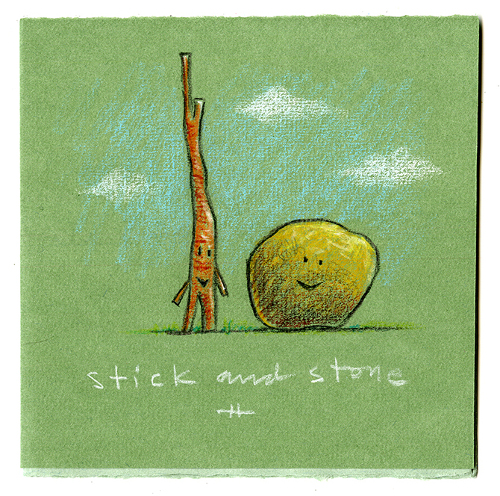
Then I did a tighter sketch, thinking about how they’d behave within the story. Although the story has lots of action, I wanted to anthropomorphize the characters as little as possible. Stick can have little arms and legs, naturally. And Pinecone gets them because … heck, he can’t even roll, but giving Stone appendages would have been cheating.
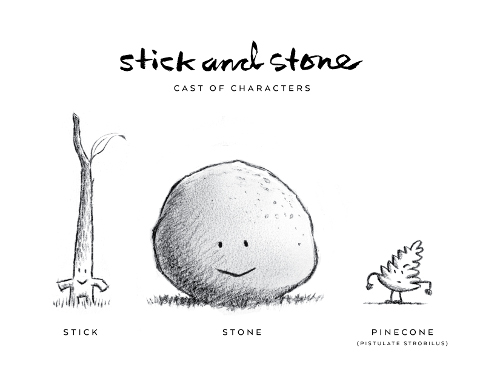
Then the mistakes began.
I began by trying to visually explain how Stick and Stone first met. This front endpaper shows a bird stretching to reach a berry in a tree.
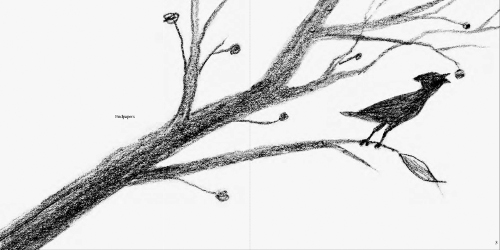
Then, on the title page, the branch snaps and falls to the ground. Thus, we have Stick…
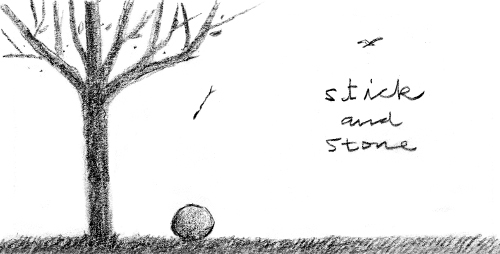
… who falls onto Stone.
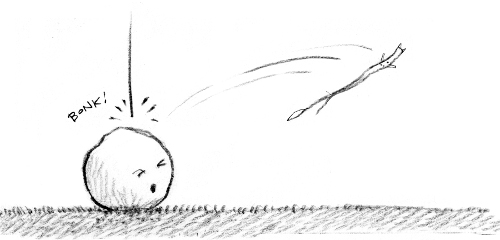
Now we have our characters — and a relationship.
But the visual story I added was answering questions that no one would ask. It was also too busy, and it didn’t establish the right level of suspension of disbelief.
But Ignoring the Voice
I went through the story and did what I often do — added side jokes and visual gags. For instance, these are from the part of the story where Stick and Stone explore the world together, building a friendship along the way. “They wander, explore.”
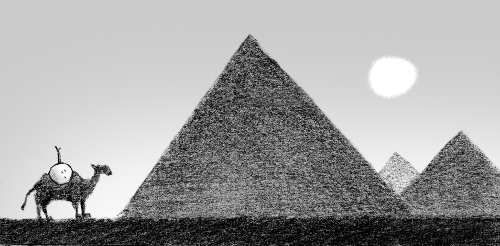
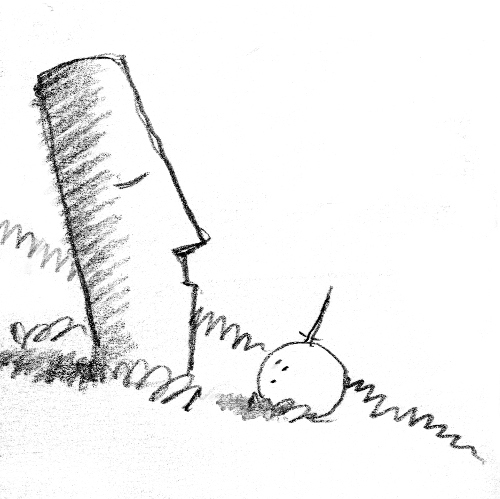
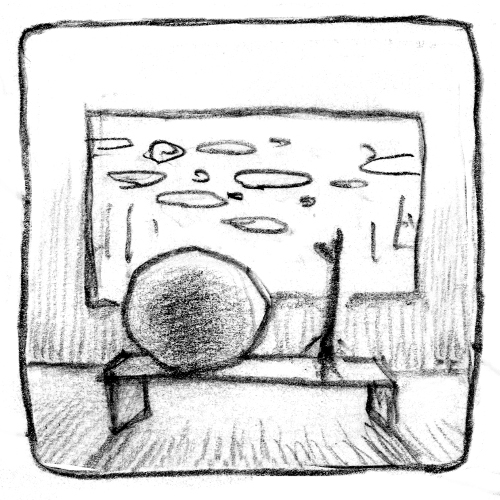
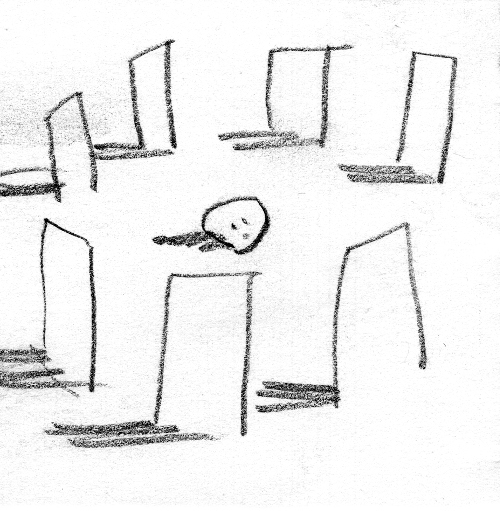
These are fun little vignettes, but they’re more about the places than the friendship that’s forming between travelling companions, so conceptually they don’t completely serve the story.
Then there’s the episode where Stick gets lost and Stone goes out searching for him, day and night. These were my first sketches.
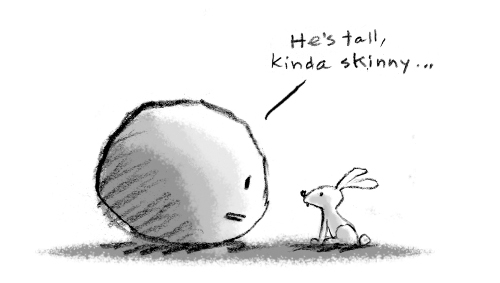
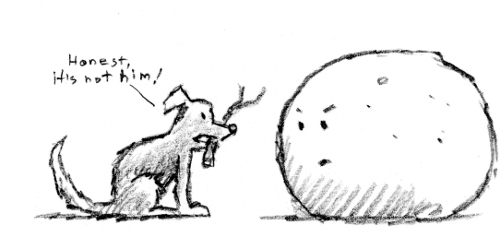
I thought Stone might organize a search party.

Then I had the idea of bringing his search to the city …
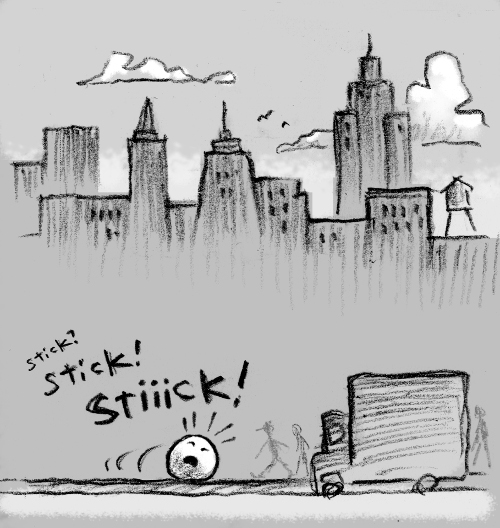
… just so I could do these two gags:
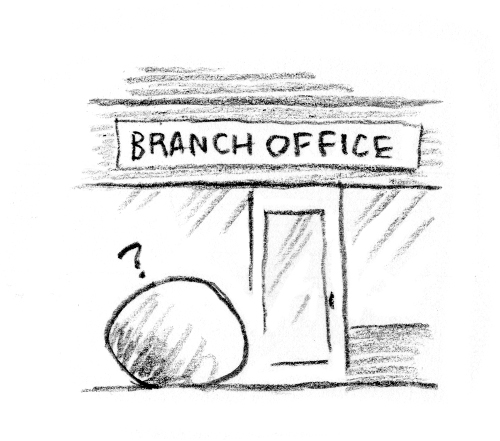
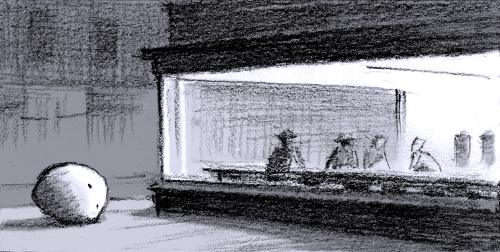
Again, these are funny — but not in harmony with the spare, poetic voice of the text, which is one of the things that initially attracted me to the project.
My background as an art director prompts me to play with composition and styles as I’m working on illustrations. This was one of my first design exercises.
Can you tell I’d just visited the Hamilton Type museum?
It didn’t take long for me to realize that the ornamental typography and all the superfluous gags were overwhelming the images and the story, so I started over, simplifying both the illustrations and the design to be more reflective of the text.
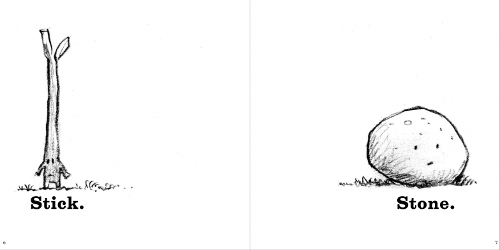
I switched to a simple font to go along with the new, minimal feel.
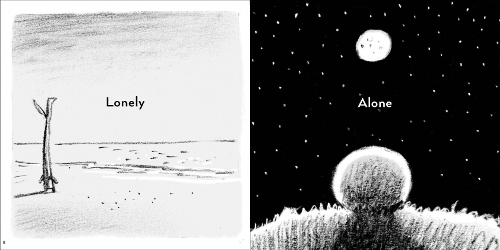
The manuscript didn’t specify a setting, so I was free to come up with an appropriate place for the interaction to start. A playground seemed logical, because it’s a fun, active place where kids have to work out a lot of relationship dynamics on their own.
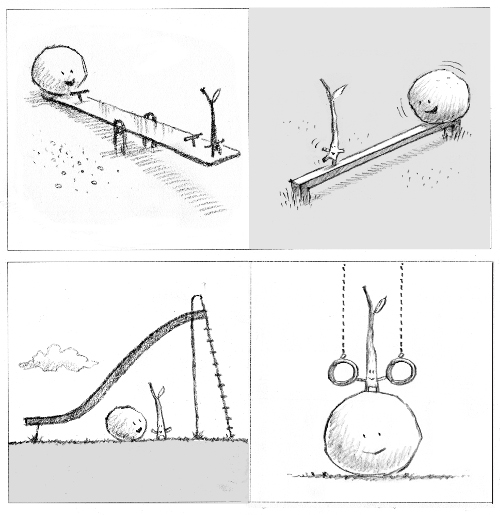
Even in this simpler version, I still found opportunities to play with the type.
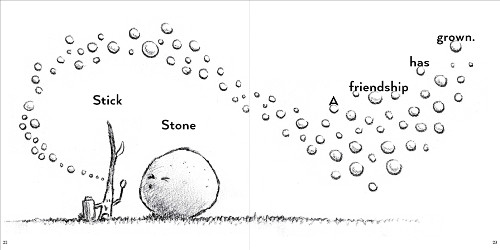
Now their travels are helping build the relationship. On the left, Stone is making a trail for Stick. On the right, they’re facing a scary situation together.
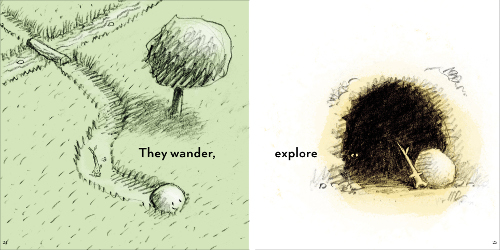
The dolphins are an inside gag — a reference to the old Houghton Mifflin logo.
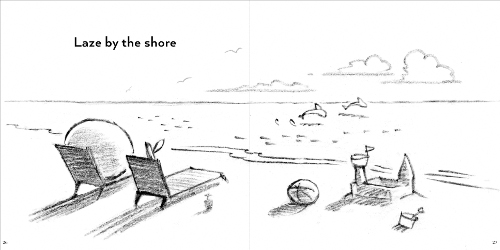

I always try to use endpapers to add a facet to the story. In this case, I used them to show the origins of our pals Stick and Stone.
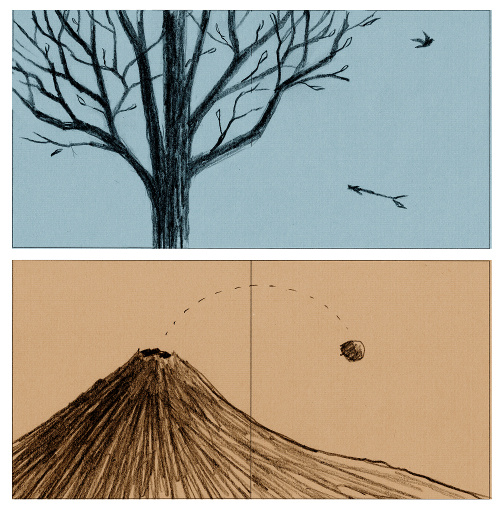
I wanted the illustrations to have some texture, so I worked on Mi-Teintes paper, which comes in a variety of earthy colors and is heavy enough to handle a variety of media.
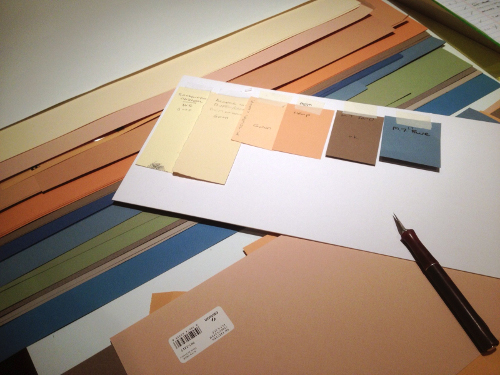
This is the entire book printed out and tacked to a large piece of foamcore in my studio. This helps me keep track of everything: paper colors, design, editorial notes, etc. Notice the variety of cover designs at the bottom, none of which were used. At the last minute, I changed my mind and came up with an entirely new cover, which the publisher graciously agreed to.
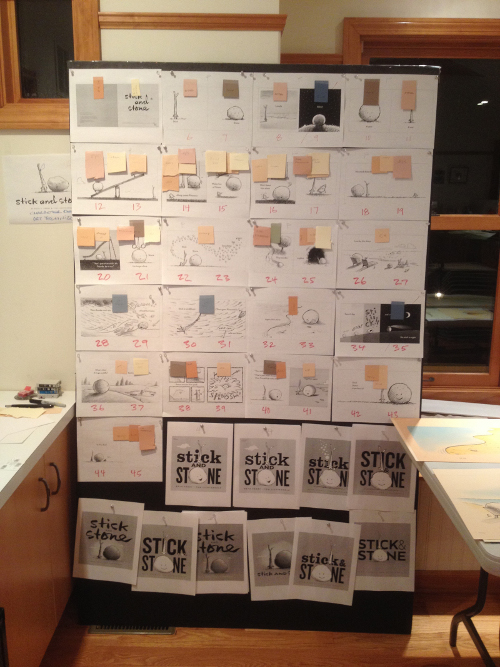
For the final art, I used Pan Pastels, watercolor dyes, and colored pencils. The paper cut-outs at the top of the frame are masks I make when using Pan Pastels.
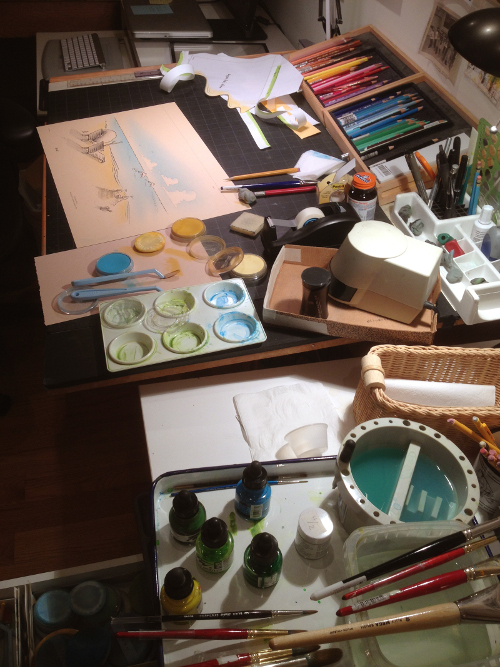
The black and white base art is done in pencil (at about 50%), then scanned, cleaned up and placed into an InDesign file. I have a large format printer that takes heavy paper and uses non-water-soluble inks, so I print the pencil art onto colored paper and start applying color.
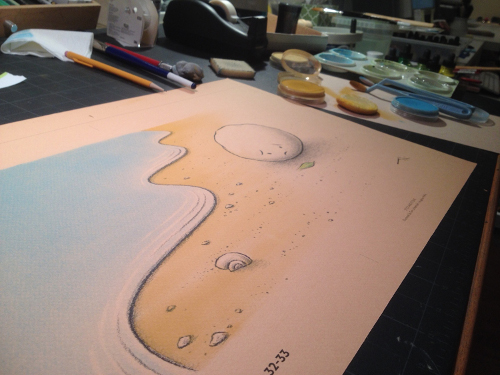
I know I could use Photoshop to do a lot of this, and I certainly do for a number of things. But in general I’ve discovered that working on paper with real tools is more stimulating. Photoshop is predictable and endlessly fixable, so there’s very little risk. And I’ve read that risk is one of the things that produces endorphins in the brain, so I will always have a studio full of unpredictable, drug-inducing art supplies.
I did each illustration a number of times, until I got something I liked. Here they are organized into piles on a large table.
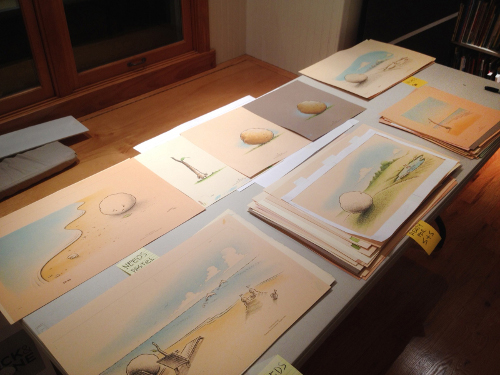
That’s my part of the story behind Stick and Stone. I’m grateful to the author, Beth Ferry, the editor, Kate O’Sullivan, the art director, Scott Magoon (yes, that Scott Magoon), and everyone else who made it happen. They’re all the best! Which reminds me … one more from the cutting room floor …
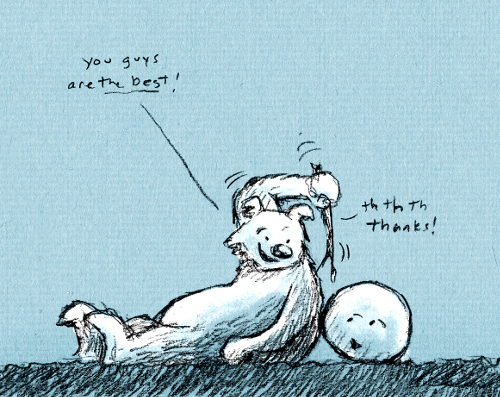
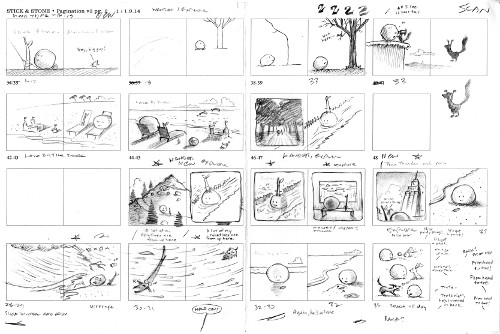
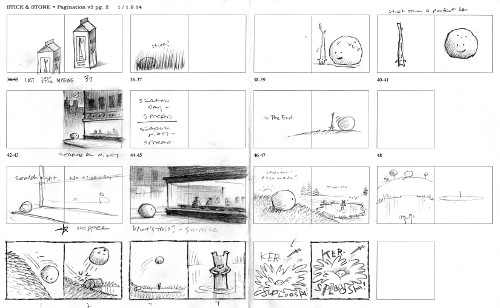
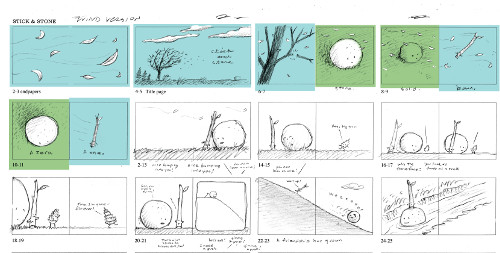
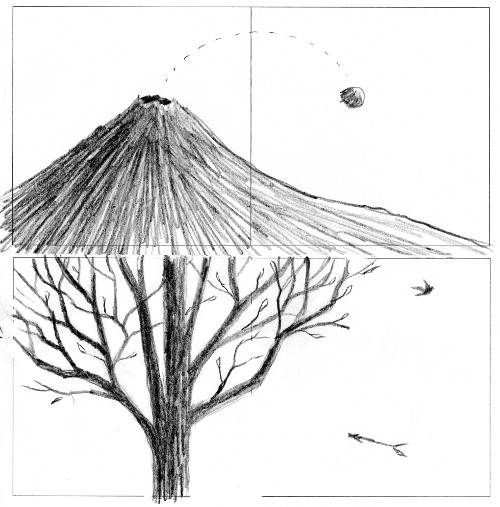
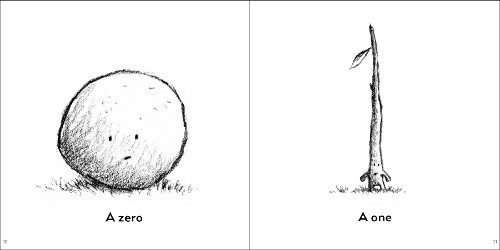
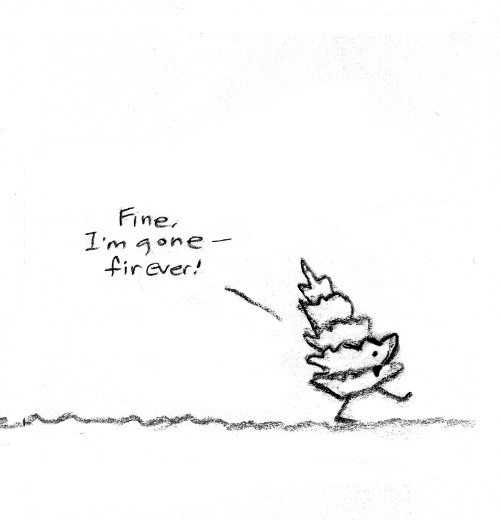
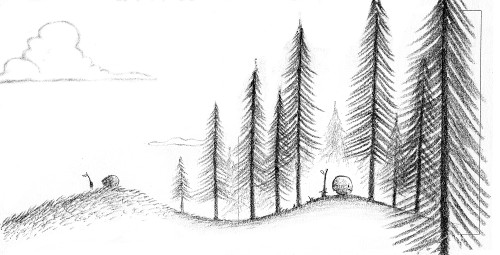
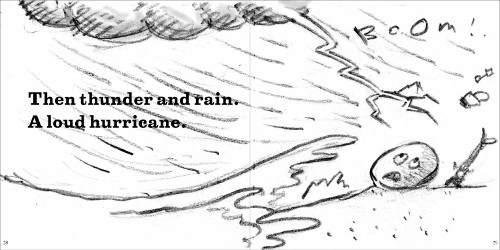
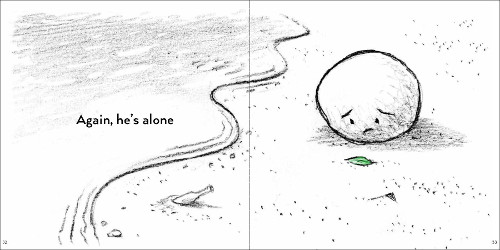
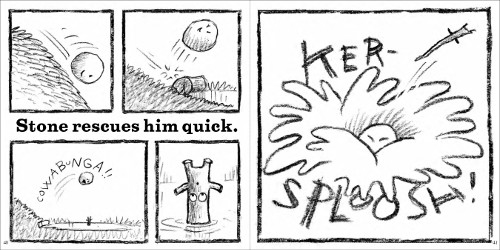
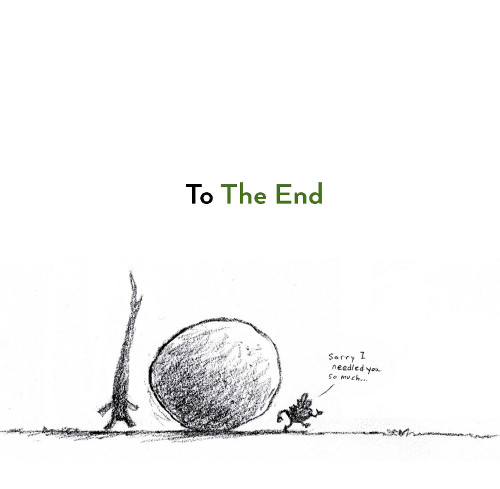
STICK AND STONE. Text copyright © 2015 by Beth Ferry. Illustrations copyright © 2015 by Tom Lichtenheld. Published by Houghton Mifflin Harcourt, Boston. All images here reproduced by permission of Tom Lichtenheld.
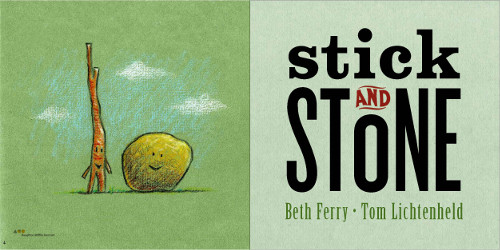
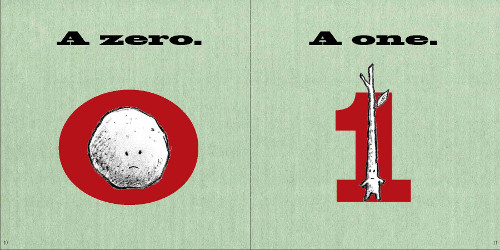
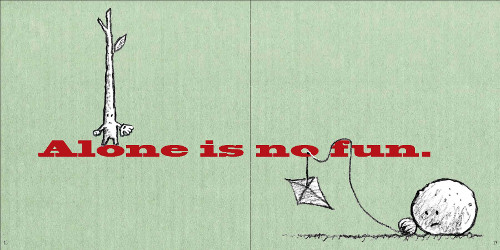
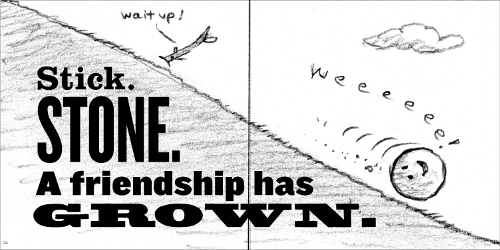

Thank you Tom and Julie, this is fabulous!! I am now going to make sure my PB writing leaves room for the illustrator to make mistakes. 🙂
Thanks, Tom. What a process! We are used to seeing the brilliance of the final product, not the labor of the process. So glad you can entertain yourself along the way. 🙂
This post was wonderful! Thank you for sharing your process with us.
Amazing! I could never be an illustrator. Your process is so mysterious and complicated. I love what you’ve shown, and I will now go back to my little writing cave—grateful that I just work with words. I bow down before the masters of visual art.
Oh wow, this was a fascinating read! Thank you for all the details shared about your process.
Thank you Tom and Jules for sharing your humor and the process. It’s just as involved as the writing part, if not more. Love the visual jokes with Pinecone
Wonderful description of your process. Loved the visuals and detail of your work
WOW! I love your work, Tom! Your dedication and talent amaze and inspire me! Thank you for sharing so much of your process!
Tom, thank you for showing us your detailed process. This has been a fascinating learning experience.
What a fantastic post! Thank you for sharing your process. But is so neat to see the illustrator’s point of view. I love this book.
I can’t wait to get this book. I love the illustrations and the story of creating them. Knowing all the mistakes really helps us all to learn. Thank you.
Wonderful interview, Tom and Jules. Tom, I’m so impressed with your thoughtful illustration process. Very inspiring. Can’t wait to get the book!
So Cute! Looking forward to seeing the whole book and learning about the process was inspiring.
I am lucky to have read a copy of this book already! I enjoyed seeing how you visualized the text in different ways.
Thank you so very much for sharing your process. Nice to be able to learn from someone else’s mistakes as well as my own!
The look inside your illustration process was incredible, Tom. I especially loved seeing your foam bulletin board and hearing that you tried many different versions before you whittled it down (pun intended) to the one that worked. 🙂
Great post!
I loved this book from the first time I read it. Now, I love even more about it having ‘watched’ Tom work his magic in creating its characters. I so appreciate Julie’s work in bringing it to us through her website and Tom’s generosity in talking about the entire process.
Well! I needed to have some fun after exercising-I am almost 70 yrs. old and spent another hour of pain and sleeping, so I typed in 7 Impossible Things. The side laughs began and the review of illustrator Tom Lichtenheld. Ha Ha and thanks! atk
There is no question that Tom Lichtenheld has become one of my all-time favorite illustrators and can’t be more thrilled that he illustrated Beth’s debut book. This is truly amazing and I actually got excited seeing your work area, Tom. So many familiar tools and a few I hadn’t thought to use! Just love this SOOOOOOOOOoooooooooo much! Thanks for posting it, Julie 😀
Just what I needed this morning! I love seeing the details of the illustrator’s process and the work in its various stages. Thanks.
Wow–what an amazing post. I loved seeing Tom’s process–very intriguing. It’s also really helpful to see the visual process and pacing, since I also write picture books (but am not an illustrator).
Thank you!!
Wonderful post so inspiring!
[…] more of Tom’s brilliance, check out: http://blaine.org/sevenimpossiblethings/?p=3730 or his website: […]
GREAT post! Hats off to Tom for this.
[…] Thank you. I did a posting on the Seven Impossible Things Before Breakfast blog showing a bunch of my mistakes. After I went down all the blind alleys, I realized what I should be […]
Love seeing your process! Wonderful book, now in my PB collection.
[…] and cuddly and utterly perfect – quite an achievement for a stick and a stone. His illustration process shows the extreme care and time he put into making the illustrations a perfect match for the text. […]
It was a treat to go inside an illustrator’s mind and see how the creation of the illustrations unfolded. I enjoyed hearing how he initially went in one direction and then started over in a simpler tone. Thank you for sharing how you worked through this.
[…] One of my favorite things is when illustrator Tom Lichtenheld stops by 7-Imp to talk about the thought processes that go behind his work. (He’s done that at least once before.) […]